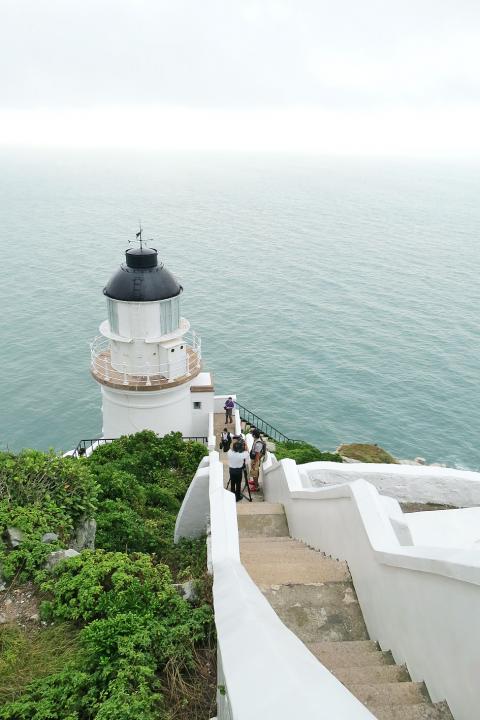A 112-year-old lighthouse on one of the outlying islands of Matsu has been upgraded to a national historical monument, with a ceremony marking the event to be held on July 1, Lienchiang County Cultural Affairs Department Director-General Wu Hsiao-yun (吳曉雲) said.
Dongyong Lighthouse in Lienchiang County’s Dongyin Township (東引) was first designated a national historical landmark by the Council of Cultural Affairs in 1988, but it was later downgraded to a county heritage site following changes to the Cultural Heritage Preservation Act (文化資產保存法).
Lienchiang County had been fighting for the lighthouse to reattain its status as a national landmark since 2008, Wu said.

Photo: Yu Chao-fu, Taipei Times
The county’s appeal gained ground after a restructuring of the Executive Yuan, which transferred management of the lighthouse from the Ministry of Finance’s Customs Administration to the Ministry of Transportation and Communication’s Maritime and Port Bureau, whose director-general, Chi Wen-jong (祁文中), supported the application, Wu said.
The European-style lighthouse situated on the slope of Shih Wei Mountain (世尾山) was built with financing from the British government a year after the British steamer SS Sobraon ran aground and sank near Dongyin Island in 1901, the Matsu National Scenic Area office said.
Although all passengers and crew survived the shipwreck, the shipping firm suffered heavy losses, and with the opening of maritime traffic to the Port of Sandu, it was decided that a lighthouse was necessary to mitigate navigational risks.
The lighthouse used to be a strictly restricted facility and lighthouse workers lived with their families in an adjacent dormitory, and raised their own chicken and pigs for meat.
The materiel and comforts provided by the lighthouse was said to be the envy of local residents, who nicknamed the facility “the Dongying Mansion,” which has stuck to this day.
The elegant structure has become a major attraction for tourists — including South Korean, Chinese and Western visitors.
Lienchiang County Commissioner Liu Tseng-ying (劉增應) said he was glad to see the lighthouse’s designation as a national historic monument, adding that he hoped the Maritime and Port Bureau and the Department of Cultural Affairs would invest resources in the lighthouse to promote tourism on Matsu.
The lighthouse could become a third attraction in addition to Matsu’s famed rare Chinese crested tern and bioluminescent blue tide, Liu said.

A preclearance service to facilitate entry for people traveling to select airports in Japan would be available from Thursday next week to Feb. 25 at Taiwan Taoyuan International Airport, Taoyuan International Airport Corp (TIAC) said on Tuesday. The service was first made available to Taiwanese travelers throughout the winter vacation of 2024 and during the Lunar New Year holiday. In addition to flights to the Japanese cities of Hakodate, Asahikawa, Akita, Sendai, Niigata, Okayama, Takamatsu, Kumamoto and Kagoshima, the service would be available to travelers to Kobe and Oita. The service can be accessed by passengers of 15 flight routes operated by

Alain Robert, known as the "French Spider-Man," praised Alex Honnold as exceptionally well-prepared after the US climber completed a free solo ascent of Taipei 101 yesterday. Robert said Honnold's ascent of the 508m-tall skyscraper in just more than one-and-a-half hours without using safety ropes or equipment was a remarkable achievement. "This is my life," he said in an interview conducted in French, adding that he liked the feeling of being "on the edge of danger." The 63-year-old Frenchman climbed Taipei 101 using ropes in December 2004, taking about four hours to reach the top. On a one-to-10 scale of difficulty, Robert said Taipei 101

MORE FALL: An investigation into one of Xi’s key cronies, part of a broader ‘anti-corruption’ drive, indicates that he might have a deep distrust in the military, an expert said China’s latest military purge underscores systemic risks in its shift from collective leadership to sole rule under Chinese President Xi Jinping (習近平), and could disrupt its chain of command and military capabilities, a national security official said yesterday. If decisionmaking within the Chinese Communist Party has become “irrational” under one-man rule, the Taiwan Strait and the regional situation must be approached with extreme caution, given unforeseen risks, they added. The anonymous official made the remarks as China’s Central Military Commission Vice Chairman Zhang Youxia (張又俠) and Joint Staff Department Chief of Staff Liu Zhenli (劉振立) were reportedly being investigated for suspected “serious

Taiwanese and US defense groups are collaborating to introduce deployable, semi-autonomous manufacturing systems for drones and components in a boost to the nation’s supply chain resilience. Taiwan’s G-Tech Optroelectronics Corp subsidiary GTOC and the US’ Aerkomm Inc on Friday announced an agreement with fellow US-based Firestorm Lab to adopt the latter’s xCell, a technology featuring 3D printers fitted in 6.1m container units. The systems enable aerial platforms and parts to be produced in high volumes from dispersed nodes capable of rapid redeployment, to minimize the risk of enemy strikes and to meet field requirements, they said. Firestorm chief technology officer Ian Muceus said